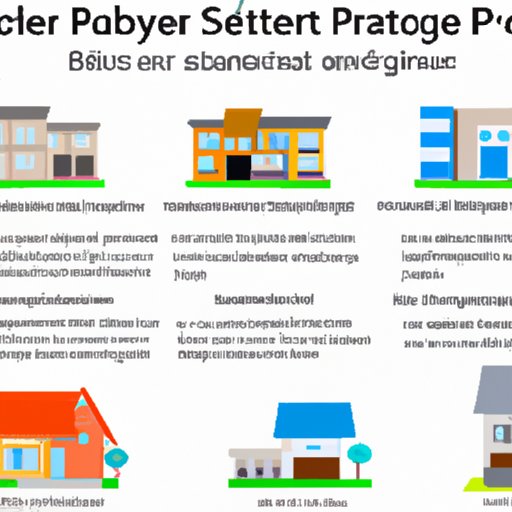Introduction
A realtor is a professional who works in the real estate industry, helping people buy and sell homes. They are licensed professionals who work with buyers, sellers, and renters to facilitate the purchase or sale of a property. Realtors often work for real estate brokerages, which provide them with access to resources and tools that help them succeed in their job. So, how does a realtor get paid?

Explaining the Different Payment Structures for Realtors
There are several different payment structures for realtors, each of which has its own advantages and disadvantages. The most common payment structure is commission-based pay. Under this structure, realtors earn a percentage of the sales price of each home they help to buy or sell. This percentage is typically between 2-3%, though it can vary depending on the market and the realtor’s experience level.
Another payment structure is salary plus commission. Under this structure, realtors receive a base salary plus a commission for each sale they facilitate. This structure can be beneficial for less experienced realtors, as it provides them with a steady income while allowing them to earn more if they close multiple deals.
Finally, some realtors work on a fee-for-service basis. In this structure, realtors charge a flat fee for their services, regardless of whether or not they successfully complete the sale. This structure is usually only used by highly experienced realtors, as it requires them to be confident in their ability to close the sale.

Examining the Role of Commissions in Realtor Pay
Commission plays a major role in how realtors get paid. Typically, the commission is split between the buyer’s agent and the seller’s agent. For example, in a typical 6% commission split, the buyer’s agent would receive 3% and the seller’s agent would receive 3%. However, this split can vary depending on a variety of factors, such as the market and the type of property being sold.
In addition to the commission split, there are other factors that influence how much commission a realtor earns. These include the size of the transaction, the location of the property, and the complexity of the deal. Experienced realtors are typically able to negotiate higher commissions than less experienced ones.

Discussing How Commission Splits Affect Realtor Earnings
The commission split between the buyer’s and seller’s agents can have a significant impact on a realtor’s earnings. In most cases, the commission is split evenly between the two agents. However, there are situations in which the split can be unequal. For example, a realtor may negotiate a higher percentage of the commission for themselves if they bring in a high-value client.
In addition, many realtors work in teams. In these situations, the team leader typically receives a larger share of the commission. Team arrangements can be beneficial for both the team leader and the other members of the team, as it allows them to split the workload and increase their earnings potential.
Analyzing the Impact of a Realtor’s Experience on Their Pay
A realtor’s experience level can have a major impact on their pay. Seniority and negotiation skills can make a big difference in the amount of commission a realtor earns. In addition, additional training and education can help realtors become more knowledgeable and successful in their profession, which can lead to higher earnings.
“Experience is one of the most important factors in determining a realtor’s earning potential,” says Mark Smith, a real estate broker in New York City. “The more experience you have, the better your chances of negotiating higher commissions and closing more deals.”
Investigating Real Estate Brokerage Fees and How They Impact Realtor Pay
Real estate brokerages typically charge a fee for their services. This fee is typically based on a percentage of the total sales price of the property. The exact amount of the fee varies from brokerage to brokerage, but it is typically between 1-2%. This fee is then split between the buyer’s and seller’s agents, and it affects the amount of commission they receive.
In addition, some brokerages also charge a flat fee for their services. This fee is usually lower than the percentage-based fee, but it can still have an impact on a realtor’s earnings. It is important for realtors to understand the fees charged by their brokerage and how they affect their earnings.
Breaking Down the Different Types of Realtor Bonuses and Incentives
In addition to their commission, realtors can also earn bonuses and incentives. These can include referral bonuses, performance-based bonuses, and other incentives offered by their brokerage. Referral bonuses are typically based on the number of referrals a realtor brings in, while performance-based bonuses are based on a realtor’s performance over a certain period of time.
Other incentives may include discounts on certain products or services, such as office supplies or marketing materials. These incentives can help realtors save money and increase their earnings potential.
Conclusion
Realtors have many different options when it comes to how they get paid. Commission-based pay is the most common payment structure, but realtors can also earn bonuses and incentives. Understanding the different payment structures and how they affect realtor earnings is essential for success in the real estate industry.
(Note: Is this article not meeting your expectations? Do you have knowledge or insights to share? Unlock new opportunities and expand your reach by joining our authors team. Click Registration to join us and share your expertise with our readers.)
